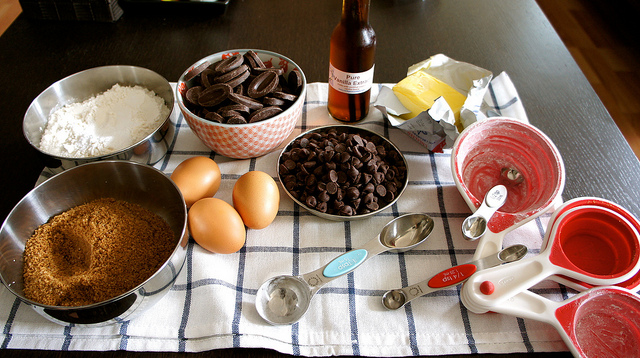Librarians in Australia are cooking recipes from unpublished works in a campaign to amend Australia’s existing copyright laws.
The aim of the campaign is to persuade Attorney General George Brandis to change the law so unpublished works are treated the same as published ones.
In Australia, the copyright terms of unpublished works, such as letters and diaries, is perpetual while published works remain in copyright for 70 years after the death of an author.
On Friday, the hashtag #CookingForCopyright will be launched online, as citizens are encouraged to show their support for change by posting pictures of their baking masterpieces on social media.
My mum has been #cookingforcopyright pic.twitter.com/Rp37IrkU4v
— Danielle (@LibDanielleJ) July 27, 2015
#cookingforcopyright challenge day 9…I’m not even icing these. They’re going straight in freezer #toomanybakedgoods pic.twitter.com/FZ04ZZPV0t
— Sarah Treweek (@SarahTreweek) July 19, 2015
The campaign is inspired by the many recipes the Australian Library and Information Association (ALIA) found in their collection of unpublished works.
Executive Director of ALIA, Sue McKerracher, said the recipes are “such a personal, family kind of thing … they’re so valuable to be shared across generations that we thought this is a perfect example”.
To date the organisation has more than 700 people cooking around the nation.
“What we’re looking to do is to get thousands of photographs sent in so that we can actually present a photography petition to the attorney general,” Ms McKerracher said.
Unpublished works versus published works
Professor of Intellectual Property at Melbourne University, Andrew Christie, said an author should be able to control what happens to his or her work, in theory.
“Copyright law thinks the author should decide whether or not their work gets published and, for that reason, when the work hasn’t been published copyright is indefinite,” he said.
However, by making it illegal to share unpublished information on the web, the law could inhibit the development of new knowledge and new creations.
“People might have deposited in a museum or an archive a diary, a photograph or even a cooking recipe with the view that the public would be allowed to see it and of course the public can look at one of those things but it would be an infringement of copyright to digitise it and make it available on the web,” Professor Christie said.
Ms McKerracher said librarians could free up some literary gems from the country’s museums, galleries and historical societies if the laws are changed.
“It would help authors who are looking for material to enrich their historic fiction or fictional accounts and also to people who are writing non-fiction [like] history and other kinds of factual material,” she said.
It would also enable citizens to access information about their family history via the Internet.
The Victorian State Library copyright officer, Janice Van de Velde, said, “At the moment technology is moving faster than the law.”
In the United States, Canada, the European Union and the United Kingdom, unpublished works come under the same terms as published works.
“This would bring us into line with our international colleagues,” Ms McKerracher said.
However, this would take away the ability of an author to decide whether or not to publish his or her work or the estate of an author to decide whether or not the work should be published.
Another way is to introduce a ‘fair-use’ defence, meaning as long as the material is used fairly, it can be published.
“I would certainly like to see Australia have a fair-use defence. If this campaign has the effect of getting Australia a fair-use defence then I’m very pleased about that and I’d like to see that happen,” Professor Christie said.
For more information on how to get involved go to the Cooking for Copyright website.
Image credit: Andrea Goh, Flickr


[…] The full article can be found on RMIT’s City Journal website. To view it click here. […]